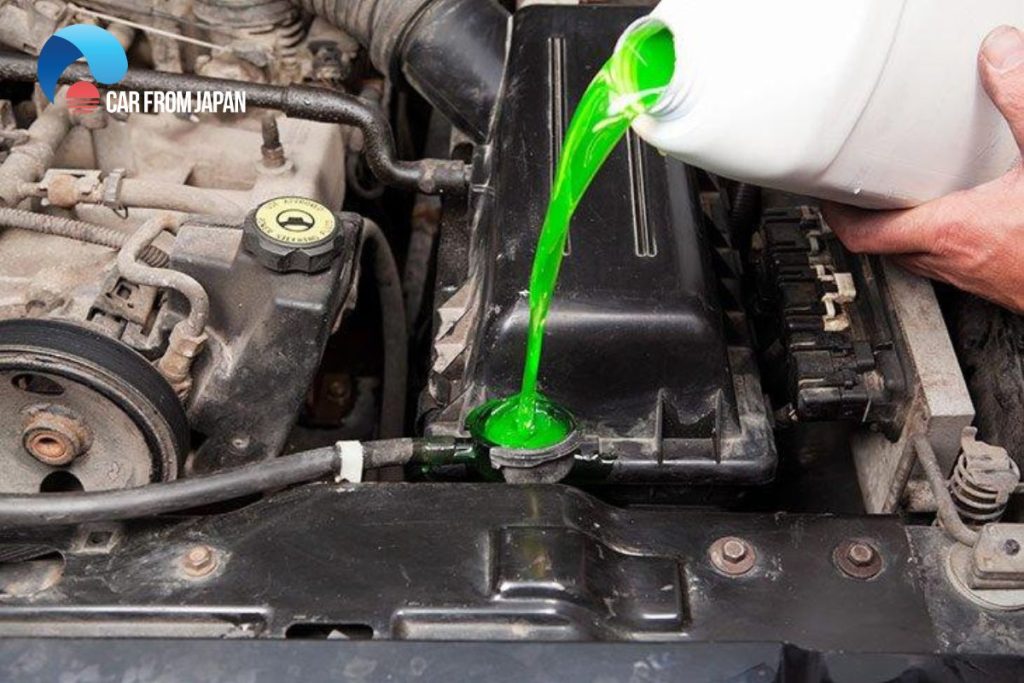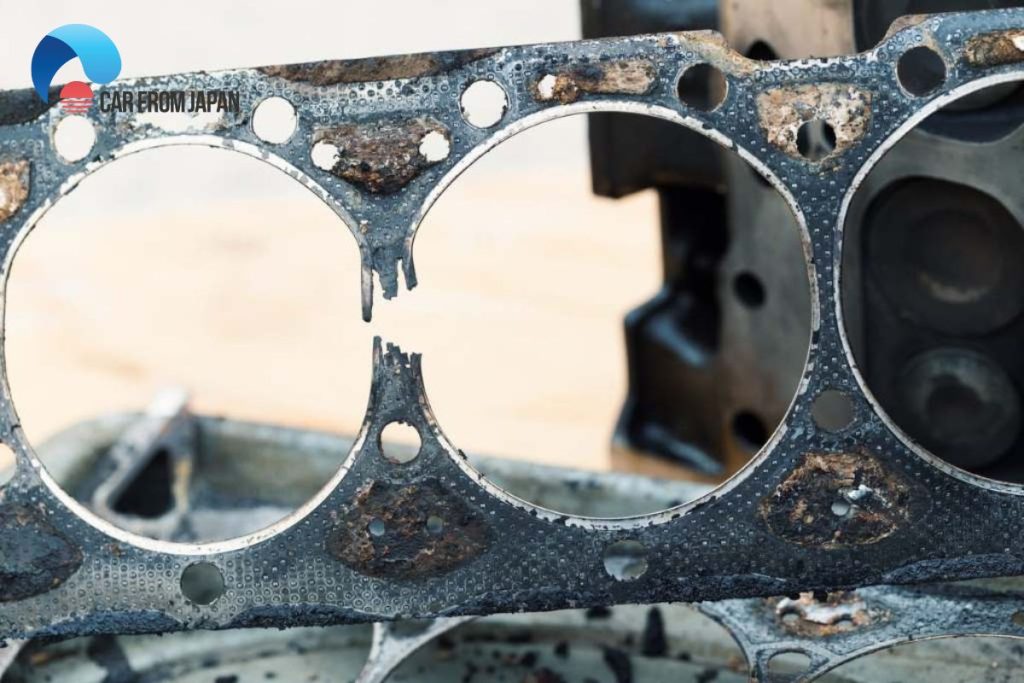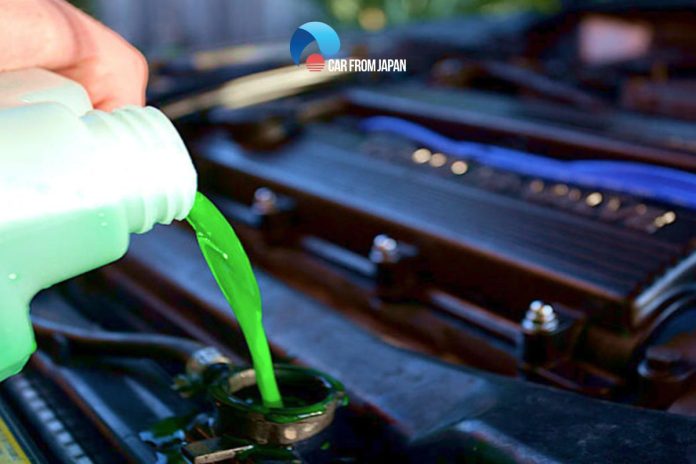Your car’s been giving off a sweet, sickly smell lately like antifreeze, but the temperature gauge is fine. It’s got you worried – what could be wrong?
In this article, we’ll find out the possible reasons and potential solutions when your car smells like antifreeze but not overheating:
Contents
What Does the Antifreeze Do?
Coolant (or antifreeze) is a fluid that helps the engine to maintain its optimal temperature. The liquid has to be a 50/50 mix of water and ethylene glycol.
It travels from the engine to the radiator through a special hose. It redistributes the heat away from the engine to save it from damage due to overheating.
The antifreeze also helps the fluid in your car stay at the right temperature during freezing winter. The excellent lubricant keeps all the components it touches lubed and corrosion-free.
Car Smells Like Antifreeze but Not Overheating: The Main Causes
What does it mean when your car smells like antifreeze but not overheating? It indicates the early stage of coolant leakage, but the car will start getting overheated if you keep driving. The ultimate disaster could be a cracked engine block if you go on too long without a fix.
There are several reasons for this problem. Chances are that it happens due to an internal or external coolant leakage or a leak in the radiator cap. If your car smells like antifreeze but not overheating, the components you should look into are:

The heater core
This component circulates warm air inside the passenger cabin. It draws warm heat from the coolant and then spreads it across the cabin.
A crack in the heater core will discharge antifreeze and you will get the odor inside your car. It happens because the air is mixed with the antifreeze odor.
Worn-out radiator cap
The radiator can handle lots of pressure but it will leak the antifreeze mixture if its cap is weak or worn-out.
A misfit cap can also cause the loss of the fluid by overflowing the tube. Just replacing the cap will solve this issue but not addressing it at the right time will damage the hose.
An external leak
A hole in the radiator or a broken hose could be the source of this problem. It drains out the coolant very quickly and there is likely to be a puddle of coolant under the vehicle, so the problem is easy to spot.
You will be able to find the leak just by observing the radiator and the hose.
An internal puncture
It’s another reason why your car smells like antifreeze but not overheating. Unlike an external puncture, there won’t be a pool under the car but you will still be able to identify the problem since the radiator will dry out pretty quickly.
It happens because the radiator overheats as an aftereffect of the coolant loss and evaporates the water faster than usual. Look into the cylinder block and head gasket to find the leak.
Broken head gasket
In most situations, it’s a question of replacing your car’s head gasket, and if you take your car in for inspection, the machine will tell you the same thing.
If the head gasket leaks, nothing will drop on the ground because it leaks everything during mining. This explains why, if a leak happens, you will just feel uncomfortable since the ground will be absolutely clean.
Looking at the exhaust will instantly tell you if your front gasket is leaking since there will be a lot of white smoke pouring out of it. Because the gas to absorb is transparent again after combustion, white suggests that something other than gas has been burnt.
Aside from gasses, the only thing that would have burned is coolant or antifreeze, indicating the location of the leak.

Engine block
As we mentioned before, an engine block can be one of the most serious problems your car may face when there is an antifreeze smell in car. Many individuals overlook the risk of an engine block leak since any leakage creates a puddle on the ground.
This is true, but only when the automobile is stopped; the engine is turned off and hence cold. If the engine is turned off, the coolant will not evaporate or turn into steam.
Only when the automobile is turned on, indicating that the engine is hot, does the coolant burn, leaving no liquid trace on the ground.
Although this is one of the rarest occurrences of leakage, the likelihood of it occurring is not nil. Taking a look at it when the engine bay is emitting smoke can only help you know exactly the coolant smell in car source.
Leaked coolant reservoir
Another possibility is that your vehicle’s coolant reservoir is leaking. Your automobile smells like antifreeze because it emits coolant through its vents. This is a common issue, but it is simple to resolve.
Simply inspect your coolant reservoir to ensure there is no leakage. If there is, simply replace the cap and ensure it is well fastened before driving away.
If this does not resolve the problem, you will need to take your car to a mechanic for diagnostic and repair.
Broken thermostat housing
A leaking thermostat casing might be the source of your car’s antifreeze odor. This is because it is leaking coolant into hot engine parts, causing them to create an antifreeze-like stench.
You’ll need to repair the leaky item and then cleanse your cooling system. This may be accomplished by taking your car to a mechanic for diagnostic and repair.
Failed water pump seal
A gasket that protects fluid from leaking out of the engine is the water pump seal. If this seal leaks, it might be the cause of your car’s antifreeze odor. Look for damp marks on the ground around your vehicle or puddles inside to detect a leak.
Replace the water pump and tighten any loose engine bolts. Check the condition of your hoses if you can’t discover a leak. Replace them if they are worn or damaged.
How To Fix When Your Car Smells Like Antifreeze?
You can follow the following steps to troubleshoot the hidden issues when your coolant leak smells wandering in your car.
Check if there is any white smoke coming from the exhaust pipe
Typically, a blown head gasket may create white thick smoke coming out of your exhaust. If you see an unusual amount of smoke from the pipe, there may be something wrong with your system.
Check if the oil is under or exceeds the standard level
To determine whether your car has a failed head gasket, one of the most common reasons why your car smells like antifreeze but not overheating, is to evaluate the oil level in the tank.
If coolant enters the combustion chamber but is not entirely combusted, it may seep through the O-rings and into the oil pan.
Remove the dipstick and look for any variations in the oil level over time to check for this. A mechanic may be able to identify coolant in the oil by smelling and touching it, but others may need to carefully check the oil level for any increases.
If coolant is detected in the oil, a blown head gasket is most likely present, and the engine should be inspected by a professional as soon as possible.
Check the engine smoke
If you find your engine spewing smoke, this might indicate a problem. To attempt to figure out where the smoke is coming from, look at the color – if it’s white, it may be coolant.
If there are no apparent leaks under your engine, check the radiator cap and the top and sides of the engine for antifreeze. If you locate antifreeze in these regions, you’ve most certainly found the source of the problem.
Check out this video from GoTech to learn more about how to find an antifreeze leak with no visible leaks:
FAQs on Car Smells Like Antifreeze But Not Overheating
Is it safe to drive my car if it smells like antifreeze but isn’t overheating?
It’s not recommended. While a minor leak might not pose an immediate threat, driving with a coolant leak can lead to more serious problems, including engine damage if left unaddressed.
Can you drive a car that smells like antifreeze with possible coolant leak signs?
Yes, you can drive a car that smells like antifreeze with possible coolant leak signs but after very soon, it will overheat. Check out this video from GoTech to learn more about how to find an antifreeze leak with no visible leaks!
Why does my car smell like antifreeze when the heat is on and the windows fog up?
This is usually an indication that a heater core has failed. It begins to leak coolant into the heater box beneath the dash. When you turn on the heater, the air passing through the box collects the coolant and deposits it on the windows, which is why you smell it.
Can old antifreeze cause overheating?
Old fluid can cause acid accumulation, become polluted with rust or scaling, and have diminished heating and freezing resistance. Degraded coolant/antifreeze may cause your engine to run hotter than usual or prevent it from igniting in cooler weather.
Final Words
While a car smelling like antifreeze without overheating might seem like a perplexing automotive riddle, understanding the potential causes can empower you to take the right steps.
From minor coolant leaks in hoses to worn-out radiator caps or broken head gaskets, diagnosing these reasons early can help you avoid the serious damage and get the timely method to fix this problem.




Thanks T.azummai have 2003 Nissan Sentra and I smell antifreeze inside my car give me your advice.ty Sam.
My 2003 Nissan sentra I have antifreeze inside my car thanks for good for advice.SS
I have a 2009 Sentra. I washed tge car at a car wash and it started steaming on tge driver side. It smells like antifreeze and looks like irs from the radiator. This morning i have no coolant loss. I still get the smell but no overheat or loss of fluid.
Thoughts?